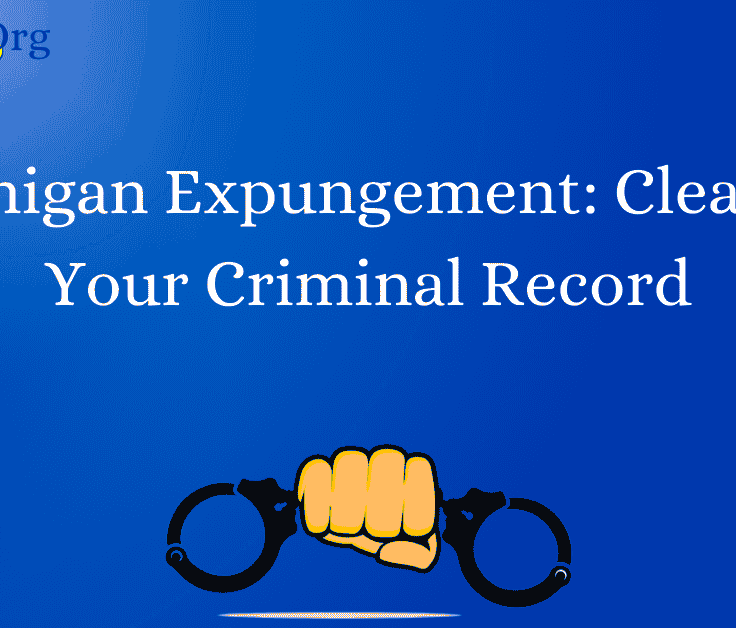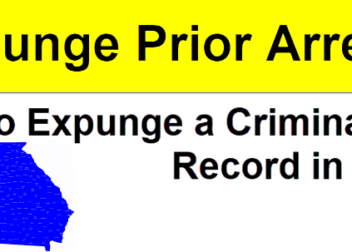Understanding Michigan Criminal Record Expungement
Expungement is a legal process that can erase certain criminal records in Michigan. If you’ve been convicted of a crime, you might feel that your past mistakes continue to haunt you. Expungement gives you a chance to start fresh by removing these records from public view. This can improve your chances of getting a job, housing, or even just feeling better about yourself. Understanding how this process works can empower you to take control of your future.
Eligibility Criteria for Expungement in Michigan
Not everyone can qualify for expungement in Michigan. Here are the main eligibility criteria:
- Type of Conviction: Generally, only specific misdemeanors and felonies can be expunged. For instance, you can expunge up to one felony and two misdemeanors.
- Time Since Sentencing: You must wait a certain period after completing your sentence. For misdemeanors, it’s typically five years, while for felonies, it’s usually ten years.
- No New Criminal Charges: You should not have any new criminal charges during the waiting period.
- Completed Your Sentence: This includes jail time, parole, probation, and payment of fines.
If you’re unsure about your eligibility, consulting with a legal professional can provide clarity.
Steps to Apply for Expungement
Applying for expungement involves several important steps. Here’s a breakdown:
- Determine Eligibility: Review the eligibility criteria to ensure you qualify.
- Gather Necessary Documents: Collect all relevant documents, including court records, proof of completed sentences, and character references.
- Complete the Application: Fill out the application forms accurately. This includes detailing your convictions and reasons for expungement.
- File Your Application: Submit your application to the appropriate court where you were convicted.
- Attend the Hearing: If your application is accepted, you will have a hearing where you can present your case.
- Wait for the Decision: After the hearing, the judge will make a decision. If granted, your record will be expunged.
It’s advisable to seek legal assistance during this process to ensure everything is handled correctly.
Documents Required for Expungement Application
Applying for expungement can seem overwhelming, but having the right documents makes the process smoother. Here’s a list of essential documents you will need:
- Application Form: This is the official form where you provide details about your conviction and request expungement.
- Personal Identification: A copy of your driver’s license or state ID to verify your identity.
- Court Records: Obtain copies of your conviction records from the court that handled your case.
- Proof of Completion: Documents showing that you have completed your sentence, including parole, probation, and any required classes.
- Character References: Letters from individuals who can vouch for your character, such as employers, mentors, or community leaders.
- Payment Receipt: Any fees associated with filing your application should be documented with a receipt.
Make sure all documents are accurate and up-to-date. It’s wise to create a checklist to ensure you have everything ready before you file.
Impact of Expungement on Employment and Housing
Getting your criminal record expunged can have a significant positive impact on various aspects of your life, especially when it comes to employment and housing. Here’s how:
- Employment Opportunities: Many employers conduct background checks. An expunged record means that potential employers will not see your past conviction, which increases your chances of getting hired.
- Professional Licenses: Certain professions require licenses that may be difficult to obtain with a criminal record. Expungement can open doors to these opportunities.
- Housing Applications: Landlords often check criminal backgrounds. With an expunged record, you can present yourself as a more reliable tenant.
- Emotional Well-Being: Removing the stigma of a criminal record can improve your self-esteem and help you build better relationships.
While expungement doesn’t guarantee you’ll never face discrimination, it definitely provides a fresh start and a chance to move forward without the weight of your past.
Common Misconceptions About Expungement
Many people have misconceptions about the expungement process that can lead to confusion. Here are some common myths and the truths behind them:
- Myth 1: Expungement erases all criminal history.
Truth: Expungement only removes certain convictions from public records, not all criminal history. - Myth 2: You can expunge any type of crime.
Truth: Only specific misdemeanors and felonies qualify for expungement in Michigan. - Myth 3: The expungement process is quick and easy.
Truth: It can be a lengthy process involving legal requirements, waiting periods, and court hearings. - Myth 4: Once expunged, employers won’t ask about your past.
Truth: While you aren’t required to disclose expunged records, some employers may still inquire about criminal history.
Understanding these misconceptions can help you navigate the expungement process with more confidence. Always consult with a legal professional for guidance tailored to your situation.
Legal Assistance for Expungement Process
Navigating the expungement process can be tricky, and seeking legal assistance can make a significant difference. Hiring an attorney who specializes in criminal law can help you understand your rights and guide you through each step. Here’s why having legal help is beneficial:
- Expert Guidance: An attorney knows the ins and outs of the expungement process, ensuring that you meet all legal requirements.
- Document Preparation: Lawyers can help prepare the necessary documents, ensuring everything is accurate and submitted on time.
- Representation in Court: If a hearing is required, having a lawyer by your side can increase your chances of a favorable outcome.
- Understanding Local Laws: Expungement laws can vary by county. A local attorney will be familiar with specific requirements in your area.
- Reducing Stress: The legal process can be overwhelming. An attorney can alleviate some of that stress, allowing you to focus on your life.
While hiring a lawyer involves costs, it can be worth the investment when it comes to securing a clean slate for your future. If cost is a concern, look for legal aid organizations that offer assistance based on income.
Frequently Asked Questions About Expungement
Many people have questions about the expungement process. Here are some frequently asked questions that might help clarify your concerns:
- Can I apply for expungement myself?
Yes, individuals can apply for expungement without a lawyer, but legal assistance can make the process easier. - How long does the expungement process take?
The process can take several months, depending on the court’s schedule and whether a hearing is needed. - What if my application is denied?
If denied, you may be able to reapply after a certain period, depending on the judge’s decision. - Will my expungement show up in background checks?
Once your record is expunged, it should not appear in most background checks, but certain entities may still see it. - Does expungement restore my voting rights?
Yes, expungement can restore your voting rights in Michigan.
Understanding these FAQs can help you feel more informed and prepared as you consider the expungement process.
Conclusion on Michigan Criminal Record Expungement
In conclusion, expungement is a vital process for individuals looking to move on from past mistakes. It can open doors to new opportunities in employment, housing, and personal growth. While the process may seem daunting, understanding the eligibility criteria, required documents, and potential benefits can empower you to take the next steps toward a clean slate.
Legal assistance can be an invaluable resource throughout this journey, ensuring that you have the support needed to navigate the complexities of the law. If you have questions, don’t hesitate to reach out to professionals who can guide you. Remember, the path to expungement is a significant step toward reclaiming your future and achieving your goals.

